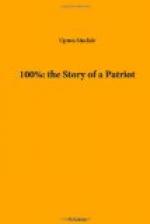In every large city in America the employers’ associations have raised funds to hold down the unions and smash the Reds, and these funds are being expended in the way portrayed in “100%.” In Los Angeles the employers’ association raised a million dollars, and the result was the case of Sydney R. Flowers, briefly sketched in this story under the name of “Sydney.” The reader who wishes the details of this case is referred to Chapter LXVI of “The Brass Cheek.” Flowers has been twice tried, and is about to be tried a third time, and our District-Attorney is quoted as saying that he will be tried half a dozen times if necessary. At the last trial there were produced a total of twenty-five witnesses against Flowers, and out of these nineteen were either Peter Gudges and McGivneys, or else police detectives, or else employees of the local political machine. A deputy United States attorney, talking to me about the case, told me that he had refused to prosecute it because he realized that the “Paul letter,” upon which the arrest had been based, was a frame-up, and that he was quite sure he knew who had written it. He also told me that there had been formed in Los Angeles a secret committee of fifty of the most active rich men of the town; that he could not find out what they were doing, but they came to his offices and demanded the secret records of the government; and that when he refused to prosecute Flowers they had influence enough to have the governor of California telegraph to Washington in protest. Questioned on the witness stand, I repeated these statements, and the deputy United States attorney was called to the stand and attributed them to my “literary imagination.”
In the old Russian and Austrian empires the technique of trapping agitators was well developed, and the use of spies and “under cover” men for the purpose of luring the Reds into crime was completely worked out. We have no English equivalent for the phrase “agent provocateur,” but in the last four years we have put thousands of them at work in America. In the case against Flowers three witnesses were produced who had been active among the I. W. Ws., trying to incite crime, and were being paid to give testimony for the state. One of these men admitted that he had himself burned some forty barns, and was now receiving three hundred dollars a month and expenses. At the trial of William Bross Lloyd in Chicago, charged with membership in the Communist party, a similar witness was produced. Santeri Nourteva, of, the Soviet Bureau in New York, has charged that Louis C. Fraina, editor of the “Revolutionary Age,” was a government agent, and Fraina wrote into the platform of the Communist party the planks which were used in prosecuting and deporting its members. On December 27, 1919, the chief of the Bureau of Investigation of the Department of Justice in Washington sent to the head of his local bureau in Boston a telegram containing the following sentences: “You should arrange




